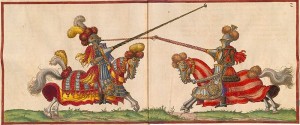 On 12th January 1510, at a private joust at Richmond Park, Henry VIII jousted for the first time as king.
On 12th January 1510, at a private joust at Richmond Park, Henry VIII jousted for the first time as king.
He and his good friend William Compton attended the joust in disguise so that nobody knew the king was taking part. However, this led to panic when one of the disguised men was injured and a man who did know that the king was taking part cried out “God save the king”:
The king was forced to reveal his identity to settle people’s fears that he had been injured. It was Compton who had been seriously hurt. Chronicler Edward Hall records the event:
“The kyng ranne never openly before, and there were broken many staves, and greate praise geven to the two straungers, but Specially to one, whiche was the kyng: howebeit, at a course by misfortune, sir Edward Nevell Esquire, brother to the Lorde of Burganie,- did runne against Master Cumpton, and hurte hym sore, and was likely to dye. One persone there was, that knew the kyng, and cried, God save the king, with that, all the people wer astonied, and then the kyng discovered hymself, to the greate comforte of all the people.”
William Compton survived the accident and served the King as his Groom of the Stool until Wolsey’s Eltham Ordinances forced his resignation. He died in June 1528 after contracting sweating sickness.
Henry VIII suffered two nasty jousting accidents and you can read more about them in the following articles:
- 10 March 1524 – Henry VIII has a jousting accident
- 24 January 1536 – A Serious Jousting Accident for Henry VIII
Notes and Sources
- Hall’s Chronicle, Edward Hall, p513